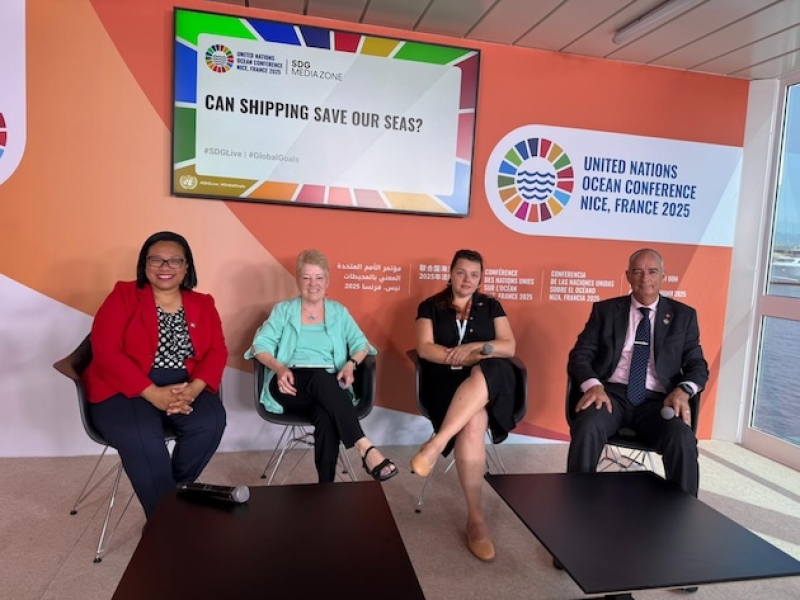- Israel Strikes Tehran with US Support Amid Nuclear Tensions |
- India Sees 9% Drop in Foreign Tourists as Bangladesh Visits Plunge |
- Dhaka Urges Restraint in Pakistan-Afghan War |
- Guterres Urges Action on Safe Migration Pact |
- OpenAI Raises $110B in Amazon-Led Funding |
Shipping industry eyes role in saving marine ecosystems

Josephine Latu-Sanft of the IMO with maritime experts at UNOC3.
Once viewed as a major contributor to ocean degradation, the global shipping industry is now repositioning itself as a potential ally in protecting marine ecosystems.
Transporting over 80% of global trade and generating more than USD 930 billion annually, the shipping sector has long been seen as an invisible yet impactful force. But at the UN Ocean Conference in Nice, industry leaders and scientists asked a provocative question: Can shipping become part of the solution to our ocean’s growing crises?
Dr. Wendy Watson-Wright, Chair of the UN Joint Group of Experts on the Scientific Aspects of Marine Environmental Protection (GESAMP), offered a nuanced answer.
“If I could start with my usual rant—just a reminder that there is only one global ocean. Just as there’s no Planet B, there is no spare ocean,” she said. She identified climate change, marine pollution, and invasive species as the most urgent threats.
Watson-Wright emphasized that the International Maritime Organization (IMO) and the broader shipping sector have taken steps to address these challenges. “The IMO and maritime sector have been working on marine plastic litter, biofouling, and greenhouse gas emissions,” she explained. GESAMP, she added, provides independent scientific advice to support marine protection and spotlight emerging issues.
A key success story is the IMO’s Ballast Water Management Convention, which aims to prevent the spread of invasive species carried in ships’ ballast water. These species, once introduced to new environments, often lack natural predators and can disrupt local ecosystems.
“Invasive species can devastate marine ecosystems,” said Watson-Wright. “Once they’re established, you can’t get rid of them.”
Simon Doran, Chair of the Global Industry Alliance for Marine Biosafety, acknowledged that the shipping industry has often been seen as an environmental villain. But he believes the narrative is shifting.
“The perception was that maritime was the bad guy. But today, shipping has the opportunity to be the good guy,” he said. “Shipping contributes only 3% of global greenhouse gas emissions, and we’re on track to reduce that. With IMO incentives and decarbonization goals, shipping will become net-zero.”
He highlighted how the Ballast Water Convention prompted companies to invest in new technologies to minimize ecological harm. “That was the first step. Next, we need stronger policies and broader adoption of sustainable practices.”
Still, challenges remain. “The two biggest barriers are regulatory uncertainty and high costs,” Doran said. He emphasized the value of partnerships like the Global Industry Alliance, which unites companies to share solutions and promote practical standards.
Gyorgyi Gurban, Head of Project Implementation at the IMO, said the organization is focused not just on creating regulations but also on helping countries—especially in the Global South—implement them.
“We are not just regulators; we are partners,” she said. “We support projects in ship recycling, marine litter, and emissions.”
She noted that developing nations stand to benefit from shipping’s green transition. “They could become providers of alternative fuels or hubs for sustainable port services.”
IMO, she added, supports these countries through capacity-building and technology transfer. “International rules apply to all ships, but we ensure that developing nations can enforce them through technical cooperation projects.”
For Watson-Wright, the key to unlocking shipping’s potential lies in science-led policymaking.
“Everywhere you turn at this conference, people are talking about evidence-based decision-making,” she said. “That’s music to my ears.”
Founded in 1969, GESAMP has long played a critical role in shaping marine policy. Its experts provide unbiased scientific assessments to nine UN agencies, including the IMO.
“Our advice must be authoritative and independent,” Watson-Wright said. “That’s what gives it strength.”
Shipping’s path to sustainability is complex, with issues ranging from decarbonization and digitalization to waste management. But for Gurban, the urgency is an opportunity.
“Shipping isn’t just about moving goods—it’s about supporting economies and safeguarding the ocean,” she said. “With smart regulation, strong science, and inclusive implementation, we can turn this global industry into a force for good.”
Backed by science and global cooperation, the shipping industry could help deliver not just cargo—but a sustainable future for our seas.
“Shipping is no longer the villain,” Doran concluded. “We’re ready to be the hero the ocean needs.”

